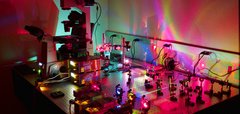Friday, 09 January, 2015
Keeping single molecules in view
New Emmy Noether group at CeNS
A new Emmy Noether Junior Research Group based in LMUs Faculty of Physics has just begun its quest for new methodologies in super-resolution microscopy specifically tailored for biomedical applications.
The goal of the newly established Emmy Noether Research Group in the Faculty of Physics at LMU is to enhance the technical capabilities of fluorescence microscopy specifically in the context of its biomedical application. The research team is headed by Dr. Ralf Jungmann, who holds a dual appointment as a Research Group Leader at the Max Planck Institute of Biochemistry in Martinsried. Jungmann and his team hope to develop new DNA-based fluorescence probes that enable them to simultaneously visualize diverse cell components at the single-molecule level.
Many biological processes involve distinct sets of biochemical entities, which interact with each other at the level of single molecules. In order to understand such processes, it is essential to dissect how individual molecules recognize, bind to, and dissociate from one another. Up to now, it has not been technically feasible to use fluorescence microscopy to monitor interactions between several different cellular components at once, simultaneously. Jungmann and his group will use a combination of fluorescence microscopy and DNA-based nanotechnology to tackle this problem. We intend to exploit the unique programmability of DNA molecules to develop novel DNA-based fluorescence probes. The teams ultimate objective is to design a methodology, which makes it possible to study hundreds of intracellular molecules simultaneously. In order to apply this approach to living cells, it will be necessary to synthesize novel non-toxic chemical compounds for use as markers.
The researchers plan to employ combinations of autonomously flashing (i.e., blinking) markers which would essentially provide the equivalent of a barcode that reflects the instantaneous distribution and functional states of a whole set of molecules of interest. This would, for instance, allow one to determine the subunit composition of a range of receptors expressed on the cell surface, many of which are known to be involved in carcinogenesis.
Before assuming the leadership of the Emmy Noether Group, Dr. Ralf Jungmann had worked with Professors Peng Yin and William M. Shih at Harvard Universitys Wyss Institute for Biologically Inspired Engineering as a postdoctoral researcher. Jungmann studied Physics at the Saarland University and the University of California in Santa Barbara, and obtained his PhD at the Technical University of Munich (TUM) under the supervision of Professor Friedrich C. Simmel. The Emmy Noether Program is administered by the Deutsche Forschungsgemeinschaft (DFG) and is designed to enable highly talented junior academics to equip themselves for a scientific leadership role.


